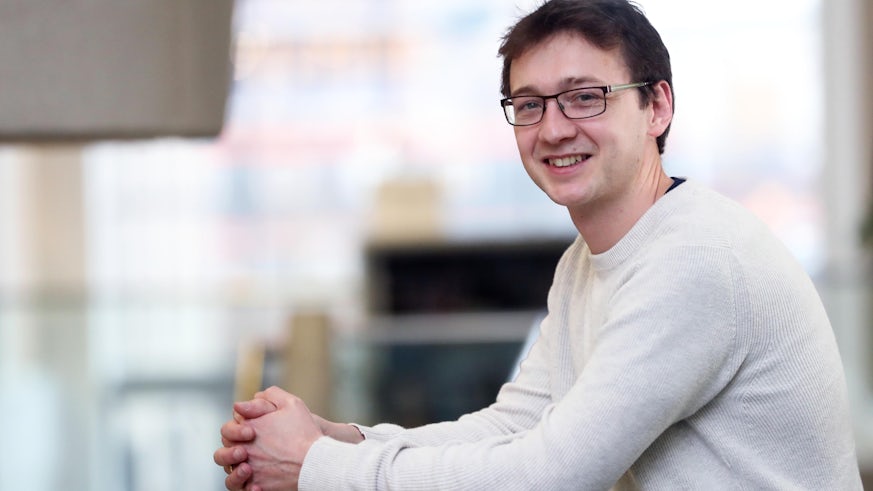Research Fellow Dr Elliott Rees awarded prestigious fellowship
23 April 2020

A Cardiff University researcher has been awarded a coveted fellowship, which aims to grow and support talented individuals needed to ensure a vibrant environment for research and innovation in the UK.
Dr Elliott Rees, Research Fellow at the Division of Psychological Medicine and Clinical Neurosciences, has been awarded the prestigious UK Research and Innovation Future Leaders Fellowship.
The fellowship award supports an investment of up to £1.2 million over four years, with the opportunity to extend to up to seven years. Recipients also benefit from outstanding support, enabling each Fellow to tackle ambitious research challenges and develop their own careers.
Dr Rees’s research aims to understand how genetic variation influences the risk for psychiatric disorders, such as schizophrenia. His fellowship will focus on delivering new insights into the biological causes of these disorders, primarily through developing novel approaches that examine the full range of genetic factors known to contribute to risk.
Dr Rees said: “In recent years, we have witnessed extraordinary progress in our understanding of the genetic basis of mental health disorders. We now know that genetic variation spread across hundreds, if not thousands, of genes influence their development.
“We also know that not everyone with a mental health condition will share the same genetic risk factors, and unaffected individuals will often carry risk mutations; this complexity has made it challenging to translate findings from psychiatric genetics towards the development of new and more effective treatments.
Dr Rees explained: “This fellowship aims to overcome these challenges by conducting a long-term programme of research that begins by bringing together different types of genetic data produced from the world’s largest schizophrenia samples, and developing new techniques to harness the full power of genomics to understand the causes of this disorder.”
By taking an interdisciplinary approach that combines advances in statistical genetics and artificial intelligence, his fellowship aims to progress three key areas of psychiatric research:
1) Understanding the biological processes underlying mental health disorders.
2) Identifying how genetic factors influence the variation in clinical presentation and response to treatment for psychiatric disorders.
3) Identifying genetic factors that reduce the risk of developing a psychiatric disorder.
Discoveries from his research will be used to inform the development of new medicines. His work also aims to identify more biologically meaningful groups of patients, which has the potential to improve clinical trials and help predict which individuals are more likely to respond to certain treatments. This will have a long-term beneficial impact on patient wellbeing, as more effective treatments would reduce the economic cost and adverse side effects associated with less-effective medicines.
The fellowship will be hosted by the MRC Centre for Neuropsychiatric Genetics and Genomics, which brings together leading experts across clinical, genomic, statistical and bioinformatic disciplines. Dr Rees will also establish new collaborations with esteemed academics from the University of Cambridge (Professor Matthew Hurles), University of California, San Francisco (Professor Stephan Sanders), University of Oxford (Professor Chris Holmes) and Takeda Pharmaceutical Company (Professor Peter Maycox).
Professor Jeremy Hall, Director of the Division of Psychological Medicine and Clinical Neuroscience, commented: “The ambitious programme of research proposed by Dr Rees is timely, as it aims to facilitate the progression of recent advances in psychiatric genetics towards a greater understanding of disease mechanisms and the realisation of precision medicine in psychiatry. The duration and resources provided by this Future Leader Fellowship will enable Dr Rees to establish his own research team and to expand his network to new partners in both academia and industry.”
Dr Rees said: “Obtaining this fellowship is a direct result of having the privilege to train and work at a world-leading psychiatric genetics research institute at Cardiff University. I have learnt so much from many brilliant colleagues over the years, but I would like to extend my thanks in particular to Mick O’Donovan, Mike Owen, James Walters, Valentina Escott-Price and George Kirov”.
